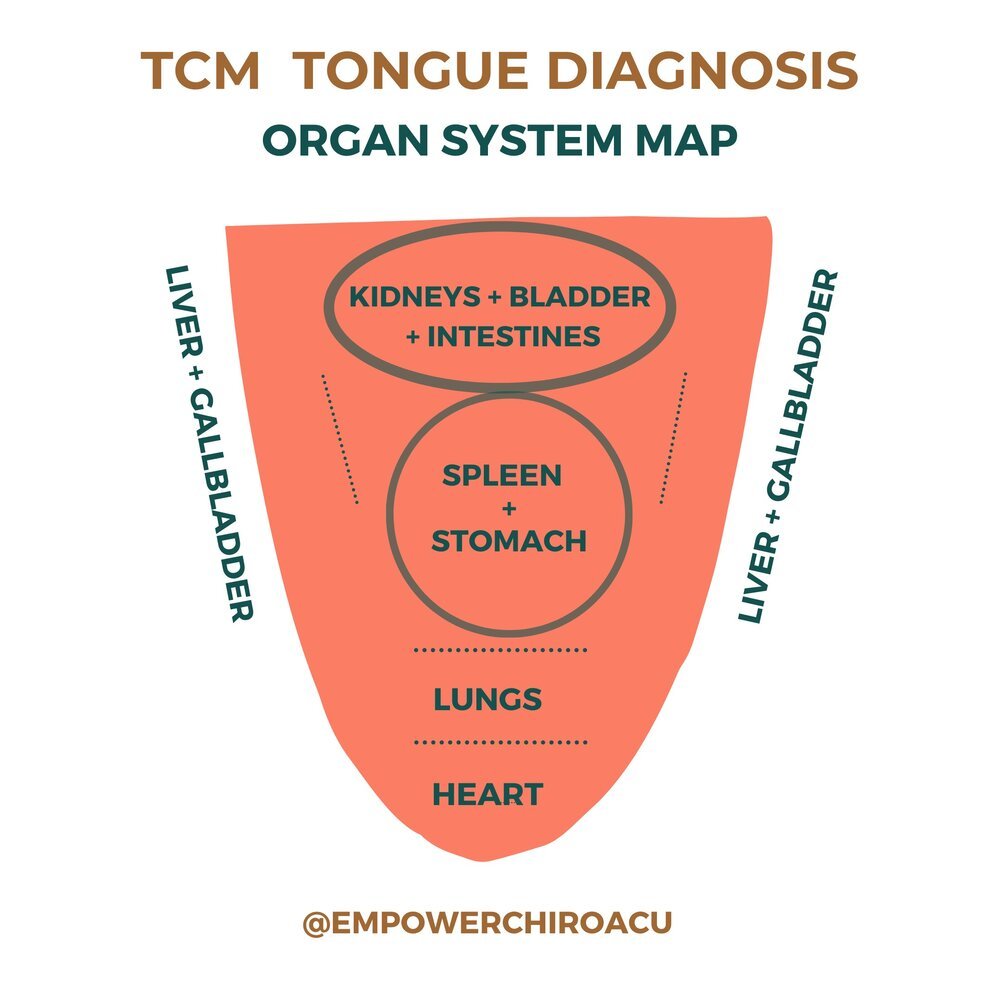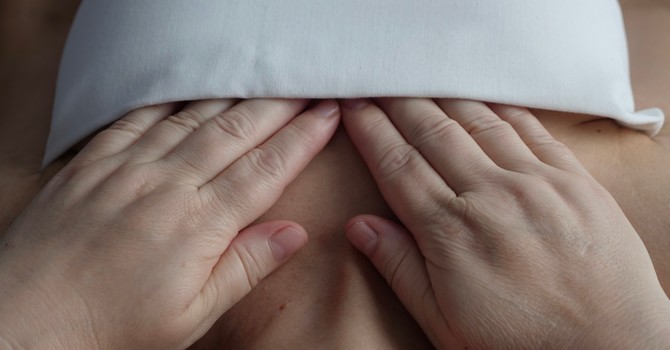TONGUE DIAGNOSIS IN CHINESE MEDICINE
An article by Dr. Lauren Dyer (DAC, LAC, MSA) discovered by our Acupuncturist Sarah Strohan.
https://empowerchiroacu.com/empowered-living-blog/what-your-tongue-reveals-about-your-health
If you have ever had Acupuncture or are thinking about setting up an appointment, get ready to be asked what might seem like a strange request: “Go ahead and stick out your tongue.”
If your eyebrow is raised in confusion, I get it. I mean, what medical professionals ever ask to look at your tongue? Not many.
Yet in TCM, Tongue Diagnosis is an essential part of our assessment and evaluation.
This is because the tongue is like a road map for your health—a mirror of what’s taking place in the body. It offers observable, objective information about the state of blood circulation, hydration, digestion, energy levels, and so much more.

In fact, each area of the tongue corresponds to the Acupuncture meridians where your vital energy or Qi (pronounced “chee”) flows through, and the internal organ systems themselves.
As you see from this diagram, the key organ systems depicted on the tongue include the Heart, Lungs, Spleen/Stomach, Liver/Gallbladder plus the Kidneys/Bladder/Intestines. Each governs a section of the tongue much like how they are laid out in the body: the front of the tongue represents the organs in the upper body, the middle of the tongue representing the digestive center...and so on-and so forth.
For practitioners, Tongue Dx is a cornerstone for understanding your current health (like a snapshot of the present), while also providing a peak into the past to detect what underlying imbalances lead to your present concerns.
There are several defining characteristics your Acupuncturist will look for when observing your tongue, like:
SHAPE - is it small, enlarged, puffy, pointed?
COLOR - is it pale, red, purple, grey?
TEXTURE - is it dry, wet, glossy, or greasy?
BODY FEATURES - are there cracks, spots, ulcers, raised speckles, or deviations?
COATING or “FUR” - is it thick, thin? Where is the fur distributed?
FUR FEATURES - what is the texture or color?
A HEALTHY TONGUE:
A “normal” and relatively healthy looking tongue is a fresh pink color, a medium thickness with a rooted light white coat on it (rooted meaning it cannot be scraped off easily). It is free of cracks, spots, ulcers, or teeth marks.
WHAT DOES YOURS SAY?

QI DEFICIENCY - Pale tongue with thin white coating, a few spots, and teeth marks
Qi Deficiency is typical if someone struggles with low energy, poor appetite, shortness of breath with exertion, bloating/gas, and worry
BLOOD DEFICIENCY - Pale tongue with little to no coating, there could also be teeth marks
Blood Deficiency is typical in someone who struggles with dizziness, fatigue, dry/thinning hair, brittle/ridged nails, palpitations, poor memory and concentration, insomnia, light/absent menstrual periods
YIN DEFICIENCY - Red to crimson tongue, usually thin, little to no coating and cracks
Yin Deficiency is typical in someone who struggles with irritability, night sweats, insomnia, hot flashes due to menopause, joint/muscle stiffness (dryness), ear ringing
YANG DEFICIENCY - Pale tongue that is puffy or enlarged, usually with a thick and white coating
Yang Deficiency is typical in someone who feels cold easily, has chronic knee and/or back pain, low spirits, is emotionally apathetic or depressed, low libido, feels exhausted/burnt-out, thyroid issues (usually hypo-)
DAMP RETENTION - Swollen or puffy tongue with a white, greasy (think oily vs. glossy wet) coating
Dampness is typical in people who have issues with indigestion, bloating, gas, loose stools, nausea, pain or muscle aches that are worse with wet/humid/damp weather
DAMP HEAT - Swollen, red tongue with a yellow-greasy coating
Damp heat is often seen in those who experience chronic inflammatory conditions such as IBS/IBD, skin eruptions (acne, psoriasis, eczema), UTIs, are easy to anger, have pain or muscle aches that are worse in hot/humid weather
QI STAGNATION - Tip of the tongue will be red, sometimes the sides too, with a thin, white coating.
Qi stagnation is evident in those who are easily stressed or emotionally upset; there is a tendency towards mood swings, muscle tension and pain patterns worse with emotional stress, pre-menstrual tension, etc.
BLOOD STASIS
Purple or mauve tongue with dark red or black spots “speckles.” Veins underneath the tongue are likely dark, enlarged, or distended.
Blood stasis is common in those who have varicose veins, leg pain, certain types of headaches, chest pain, liver spots, cold limbs, skin dryness or scaling (lacks moisture/luster), pain patterns will have a sharp or stabbing quality.
HEAT - Red tongue with a thin and yellow coating, can be red spots on tongue body too
Heat is often seen in those who subjectively feel or “run hot,” sweat easily, high thirst, constipated, short tempered, easily agitated, have skin issues (red-painful acne)
A WORD TO THE WISE
Of course, these are generalizations and very basic diagnostic patterns.
Everyone’s tongue is just as unique as their body’s constitution. Depending on the person, there can be a mixture of features on the tongue—and patterns in their diagnosis!
With that said, noticing variations on your tongue is normal and should not be a cause for alarm. These features alone do not definitively mean something is wrong or pathologically awry in those organ systems.
So please, a word to the wise: don’t panic looking at your tongue.
Accurate tongue diagnosis is a skill that Acupuncturists spend four years mastering in school and sharpening in practice.
So if you have questions or concerns, consult with a Registered Acupuncturist (R.Ac) who is trained to decipher the nuances present on your tongue—but more importantly, detect the underlying root issues to the symptoms you are facing.
TO SCRAPE OR NOT TO SCRAPE…
Oh and one more thing! If you do decide to meet with an Acupuncturist—your first visit or a follow up—please do not brush or scrape your tongue beforehand! We need to be able to see the full picture—tongue coating and all.
It will help make our evaluation of what’s taking place internally more accurate.
Now find yourself some good lighting, a mirror, and go ahead—stick out your tongue.



